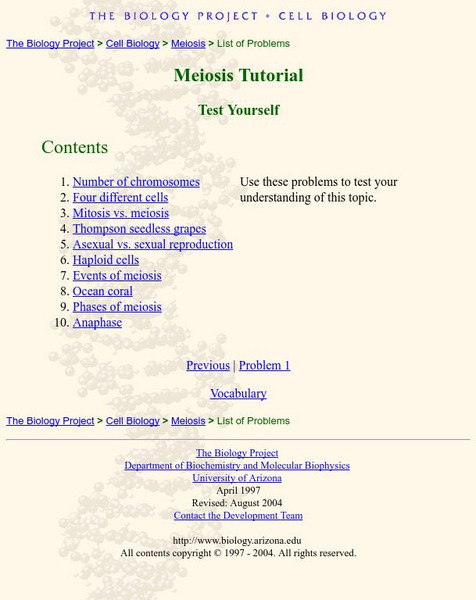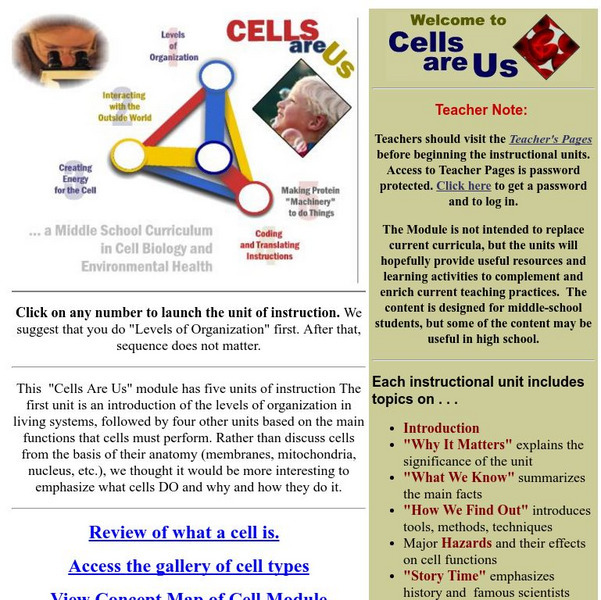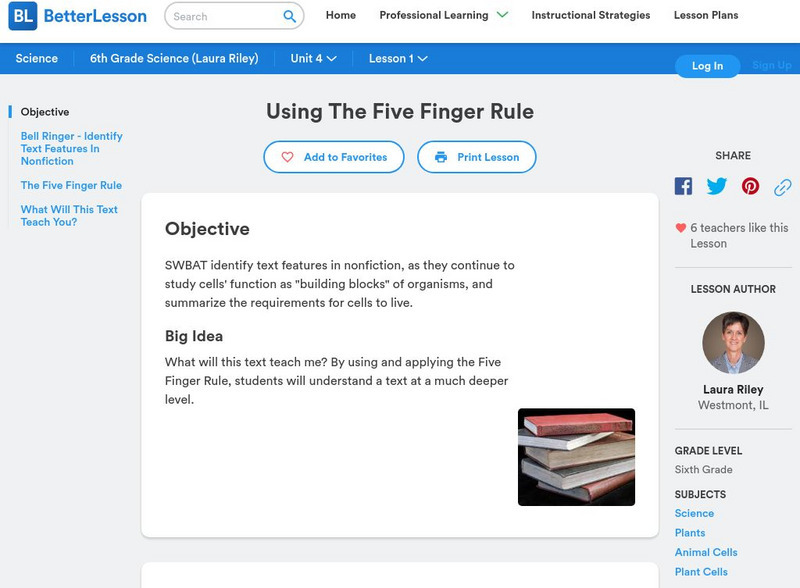Read Works
Read Works: Famous Scientists Robert Hooke
[Free Registration/Login Required] This passage contains a short biography of Robert Hooke, his development of a microscope, and his discovery of cells. he developed. This passage is a stand-alone curricular piece that reinforces...
Read Works
Read Works: The Cells That Make Us
[Free Registration/Login Required] A literary text about a boy who skins his knee and then learns all about cells and how they work to form living things. A question sheet is available to help students build skills in reading comprehension.
CK-12 Foundation
Ck 12: Life Science: Organization of the Human Body
[Free Registration/Login may be required to access all resource tools.] Cells, like these nerve cells, do not work in isolation. To send orders from your brain to your legs, for example, signals pass through many nerve cells. These cells...
Soft Schools
Soft Schools: Biology Quizzes: Cell Structure and Function
Assess your understanding of cells and their function with this interactive multiple choice quiz. Immediate feedback is provided.
Estrella Mountain Community College
Estrella Mountain College: Cell Division and Meiosis
Resource provides a holistic and complete meiosis lesson with illustrations, animations, glossary, and links. Extremely detailed and helpful site.
Cells Alive
Cells Alive!
Animation studio that specializes in medical illustration lets you explore the structure and function of plant cells and animal cells, using videos and interactive graphics with clickable parts that lead to more detail.
OpenStax
Open Stax: Structural Organization of the Human Body
Try considering the structures of the body in terms of fundamental levels of organization that increase in complexity: subatomic particles, atoms, molecules, organelles, cells, tissues, organs, organ systems, organisms and biosphere....
Texas A&M University
Peer Curricula: Cells Are Us
Find five instructional units on cells: levels of organization, interacting with the outside world, creating energy for the cell, coding and translating instructions, and making protein "machinery" to do things. Each unit is broken down...
CommonLit
Common Lit: Things Get More Complicated When You're Older
A learning module that begins with "Things Get More Complicated When You're Older" by BirdBrain Science, accompanied by guided reading questions, assessment questions, and discussion questions. The text can be printed as a PDF or...
CK-12 Foundation
Ck 12: Life Science: Cell Biology
[Free Registration/Login may be required to access all resource tools.] A cell is the smallest structural and functional unit of an organism. Learn more about cell biology in this learning module produced by CK-12.
PBS
Pbs Learning Media: Immune Cells in Action
In this video segment from The Secret of Life, watch as a virus attacks a cell, and learn how the immune system reacts to this onslaught. Includes background reading material and discussion questions. [1:40]
Better Lesson
Better Lesson: Using the Five Finger Rule
Students identify text features in nonfiction, as they continue to study cells' function as building blocks of organisms, and summarize the requirements for cells to live.
E-learning for Kids
E Learning for Kids: Science: Antarctica: How Are Living Things Described?
Learn about the different levels of organization in living things, from cells to organisms.
The Wonder of Science
The Wonder of Science: Ms Ls1 3: Interacting Body Systems
Work samples, phenomena, assessment templates, and videos that directly address standard MS-LS1-3: interacting body systems.
CommonLit
Common Lit: "Let's See What You're Made Of" by Bird Brain Science
This informational, scientific text explains how cells, the smallest unit of a living organism, make up every living thing in the world. As you read, take notes on the comparisons used in the text to explain how cells work. [Free account...
SMART Technologies
Smart: Cells Basic Units of Life
This lesson focuses on cells including what they are, the parts of a cell, types of cells, organelles and their functions and more.
Oak Ridge National Laboratory
Human Genome Project: Project Information
This site provides from the Human Genome Project provides basic information on the Human Genome Project. Among the items discussed is how genome sequencing is done, as well as information about the genome and proteome.
Khan Academy
Khan Academy: Distributing Sites Randomly
This video [2:41] lesson, learners learn about the best way to distribute points randomly. They can explore the interactive program used in the two video links provided.
Khan Academy
Khan Academy: Poisson Disc Process
This is a five-problem quiz/exercise, students will learn how the Poisson disc process works and why it's used. They will match the method of distributing sites with the resulting distribution of distances by dragging the distribution in...
CK-12 Foundation
Ck 12: Earth Science: Evolution of Simple Cells Study Guide
Review your understanding of the evolution of simple cells.
Khan Academy
Khan Academy: Cellular Organelles and Structure
The resource from Khan Academy and the Association of American Medical Colleges provides study content for the MCAT. This resource discusses cellular organelles and cellular structure.
CK-12 Foundation
Ck 12: Life Science: 11.62 Humoral Response
Learn about the human body's immune response to pathogens.
CK-12 Foundation
Ck 12: Life Science: 11.26 Blood
Understand the physiological make-up of human blood.
















